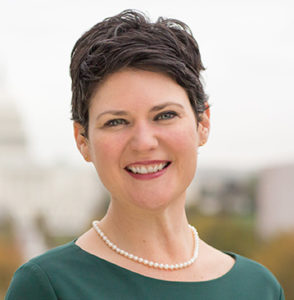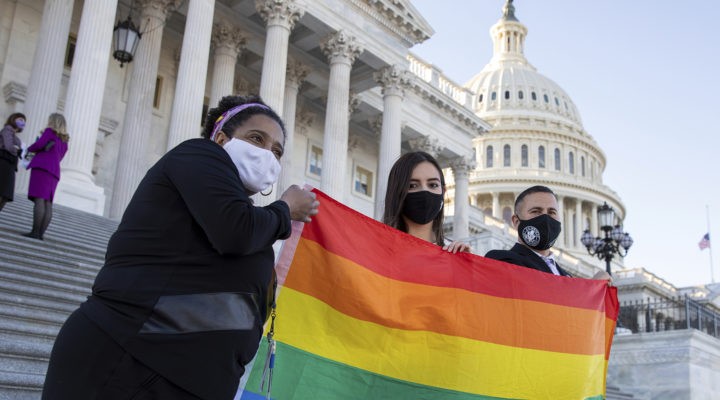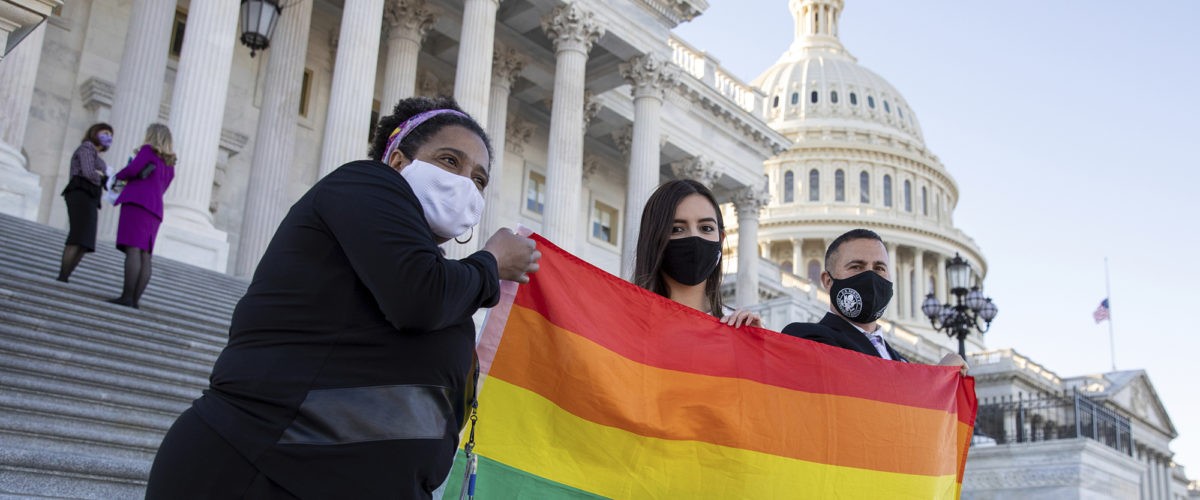When the U.S. House of Representatives passed the Equality Act last week, the long-simmering battle between religious conservatives and the rest of the nation reached a renewed pitch.
At stake is the desire of religious conservatives — especially evangelical Christians — to be able to exclude themselves from having to provide services or accommodations to people they believe are living in grievous sin, pitted against Americans who believe gay, lesbian, bisexual and transgender persons ought to enjoy protection from all discrimination.
In a sense, this is the ultimate expression of the so-called “culture wars” that have defined evangelical involvement in U.S. politics for the past 50 years. Other than abortion, no other issue motivates conservative evangelical voters like sexual orientation and gender identity.
Views against the Equality Act
The Heritage Foundation warns the Equality Act “would further inequality by penalizing everyday Americans for their beliefs about marriage and biological sex.”
Sarah Kramer of the Alliance Defending Freedom charges that the Equality Act “could regulate speech, forcing certain beliefs and ideas out of the public square under the threat of punishment. Specifically, those who believe that marriage is between one man and one woman or that biological sex is immutable could, in too many circumstances, no longer be permitted to speak or act consistently with those beliefs.”
Five committee chairmen of the U.S. Conference of Catholic Bishops wrote to Congress to protest the Equality Act.
Five committee chairmen of the U.S. Conference of Catholic Bishops wrote to Congress to protest the Equality Act, saying it “represents the imposition by Congress of novel and divisive viewpoints regarding ‘gender’ on individuals and organizations. This includes dismissing sexual difference and falsely presenting ‘gender’ as only a social construct.”
Evangelist Franklin Graham took to social media to issue his own warnings against the Equality Act: “If passed, the Equality Act would devastate women’s sports and open the door for men who identify as women in restrooms, dorms, locker rooms, women’s shelters, and much more.”
Views for the Equality Act
On the other hand, the ACLU warns that although “under current federal law, LGTBQ people cannot be fired from their job just because of sexual orientation or gender identity,” there are “critical gaps that must be addressed.” To that end, “it’s more important than ever that LGBTQ people have comprehensive, nationwide protection against discrimination.”
Writing for NBC News, Guthrie Graves-Fitzsimmons of the Center for American Progress argues that “for years the religious right has trumpeted a lie: that its opposition to LGBTQ nondiscrimination protections has to do with, or is even required by, religion. It has even, on occasion, distorted the meaning of religious freedom to make this argument. But as its opposition to the Equality Act … shows, the idea that LGBTQ nondiscrimination protections undermine protections for religious Americans is an egregious mistruth.”
“The idea that LGBTQ nondiscrimination protections undermine protections for religious Americans is an egregious mistruth.”
The Human Rights Campaign explains on its website: “Despite significant steps forward, lesbian, gay, bisexual, transgender and queer (LGBTQ) Americans lack basic legal protections in states across the country. The patchwork nature of current laws leaves millions of people subject to uncertainty and potential discrimination that impacts their safety, their families, and their day-to-day lives.”
What is the Equality Act?
Described by its authors as intended to “prohibit discrimination on the basis of sex, gender identity and sexual orientation,” House Resolution 5 would amend the Civil Rights Act of 1964 at multiple points. Repeatedly, it would add the phrase “including ‘sexual orientation’ and ‘gender identity’” to statements defining classes of people protected from discrimination.
The bill includes 23 “findings” that describe the kinds of discrimination currently faced by those in the LGBTQ community. The last of those states: “This Act furthers the government’s compelling interest in the least restrictive way because only by forbidding discrimination is it possible to avert or redress the harms described in this subsection.”
That language — “furthers the government’s compelling interest in the least restrictive way” — is key to understanding the religious implications of the legislation. Those words are a direct reference to the 1993 Religious Freedom Restoration Act.
RFRA, as the 1993 legislation is commonly known, says the federal government may not “substantially burden” a person’s religious exercise unless doing so is the least restrictive means of furthering a compelling governmental interest.
Liberal lawmakers today worry that RFRA will be used to provide cover for discrimination against LGBTQ people on religious grounds.
Although passed with support of a bipartisan coalition led by Baptist Joint Committee for Religious Liberty, more liberal lawmakers today worry that RFRA will be used to provide cover for discrimination against LGBTQ people on religious grounds.
These fears were stoked by a 2014 Supreme Court ruling in Burwell v. Hobby Lobby that said RFRA allows a business to deny employees health insurance for contraceptives on religious grounds, even though such coverage was mandated by the Affordable Care Act.
On the other hand, the Supreme Court’s June 2020 ruling in Bostock v. Clayton County found that the protections guaranteed by the 1964 Civil Rights Act “on the basis of sex” also extend to discrimination against LGBTQ persons. While LGBTQ advocates celebrated that win, they were alarmed by Justice Samuel Alito’s dissent, where he described RFRA as a “super statute” that may displace the use of federal employment laws to protect gay and transgender workers.
Given the conservative majority now on the Supreme Court, liberals fear the court could in the future give more deference to religious conservatives who believe sexual orientation is a controllable (and sinful) choice, oppose same-sex marriage and believe gender is a binary reality determined at birth.
Those claims, liberals fear, could be made under the terms of RFRA, which speaks in broad terms and does not single out classes of religious belief or discrimination.
That’s why the Equality Act includes this key sentence: “The Religious Freedom Restoration Act of 1993 shall not provide a claim concerning, or a defense to a claim under, a covered title, or provide a basis for challenging the application or enforcement of a covered title.”
In lay terms, that sentence means anyone who wants to limit services or accommodations available to LGBTQ persons could not do so claiming their own right to religious freedom under RFRA.
Keeping faith in RFRA
As with another bill (the Do No Harm Act) just reintroduced into Congress, the Equality Act is viewed by some religious liberty advocates as possibly doing the right thing the wrong way.
That is the concern expressed in a Twitter thread from Amanda Tyler, executive director of BJC.

Amanda Tyler
“As a Christian organization dedicated to faith freedom for all, @BJContheHill supports protections that are necessary to ensure that all people have access to opportunities, including employment, housing, and basic goods and services,” she tweeted. “Discrimination and other affronts to human freedom also harm faith freedom for all. @BJContheHill respects and supports the broad goals of the #EqualityAct.”
However, the carve-out from RFRA in the Equality Act could be unnecessary, she implied: “Courts generally have held that compliance with nondiscrimination laws is a compelling government interest and have denied almost all RFRA challenges to such laws.”
She continued: “So what’s wrong with a preemptive carve-out? The strength of RFRA is its universal application to all federal laws. It was designed as a balancing test to be applied on a case-by-case basis. Selectively applying the standard chips away at broad support for religious freedom. As shown in the House debate, opponents of the Equality Act use the RFRA carve-out to claim an attack on religious freedom. The alarmist rhetoric is overblown and misleading. But perhaps there is a better way to support the aims of the bill and protect religious freedom.”
Tyler’s conclusion: “The Equality Act could be more explicit about religious exemptions, including for houses of worship. Clarity would address many of the far-flung hypotheticals used by the bill’s opponents and show the bill’s supporters value both nondiscrimination and religious freedom.”
Public opinion versus political reality
However inelegant its execution, the legislation put forth by Congressional Democrats in the Equality Act resonates with the views held by a majority of Americans. The national majority opinion does not always translate into easy legislation, however, because senators and representatives are not elected by the nation as a whole but by subsets of the nation.
The research firm PRRI finds that “large majorities of most religious groups support the protections within the Equality Act.”
The research firm PRRI finds that “large majorities of most religious groups support the protections within the Equality Act.”
For example, PRRI data show that 84% all Americans oppose allowing licensed professionals to refuse to provide services to particular groups of people if doing so violates their religious beliefs. That category would include professions such as doctors, lawyers, teachers and social workers.”
PRRI Research Director Natalie Jackson added: “White evangelical Protestants are least likely to oppose allowing licensed professionals to refuse service to specific groups, but even among this group, more than two-thirds (68%) oppose such religious exemptions.”
Also, data released from PRRI in fall 2020 found that if Americans had to vote on allowing same-sex marriage, it likely would pass handily. PRRI’s national poll found a majority of Americans (70%) favor allowing gay and lesbian couples to marry legally, compared to only 28% of Americans who oppose it. Majorities of Democrats (80%) and independents (76%), as well as half of Republicans (50%), support same-sex marriage.
White evangelical Protestants were found to be the only major religious group in which a majority oppose allowing same-sex marriage (34% favor, 63% oppose).
Gallup polling data also confirms the trend. In June 2020, Gallup reported: “Two in three Americans (67%) say marriages between same-sex couples should be recognized by the law as valid, matching the previous high Gallup measured in 2018.”
For now, the Equality Act has passed the House and awaits debate in the Senate. This isn’t the first time for the bill to get a hearing in Congress.
Similar bills have been proposed in Congress since the 1970s, but the current version of the Equality Act first appeared in 2015. It passed the Democratic-led House once before, on May 17, 2019, on a bipartisan 236–173 vote. However, it died in the Republican-led Senate, where it did not get consideration.
This year, the House passed the Equality Act by a vote of 224 to 206 on Feb. 25, with help from three Republicans. Although Democrats now control the Senate, they have the slimmest of margins there, which makes the bill’s consideration uncertain at best.
Related articles:
If court reverses same-sex marriage it will do so against what majority of Americans want
Does landmark religious freedom legislation need a fix or is it fine as is?
You might have missed this, but the Supreme Court just opened a new term


